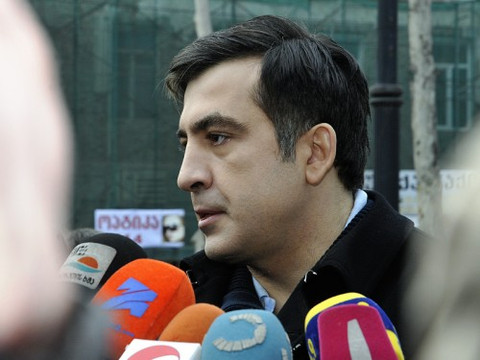
Last year a 83,800 strong public petition forced president Volodymyr Zelensky to make more stringent an electronic asset declaration registry — reporting the incomes and assets of Ukrainian officials and their family members (Photo: Jesus Monroy Lazcano)
As the war rages on in Ukraine, the country remains keen to progress in its bid to join the European Union. In mid-March, Ukrainian prime minister Denys Shmyhal even expressed the hope that accession negotiations could already start in the first half of this year, as proposed by the European Commission earlier this month.
Last summer, EU Commission president Ursula von der Leyen notably praised Ukraine’s anti-corruption progress as “amazing”, as the country was “implementing these reforms despite the war”.
-

Georgian ex-president Mikheil Saakashvili was appointed as governor of the Odessa region. However, he eventually resigned, notably citing the Ukrainian government's excessive corruption (Photo: Communications Office of the President of Georgia)
Despite this, her institution has also continued to remind Kyiv that it still needs to reform a whole range of judicial and anti-corruption reforms.
Meanwhile, worrying stories about Ukrainian corruption have continued to surface, from politically-connected companies using the war to enrich themselves at the expense of competitors to the detention of an investment banker who complained about corruption. Sunlight is the best disinfectant— so in a way, it is encouraging to see corruption scandals coming to the fore, as this may deter potential future graft, a key prerequisite for Kyiv’s eventual EU accession.
It is encouraging to see that the Ukrainian public truly wants improvement on this front. In September 2023, a public petition collecting more than 83,800 votes over two days forced president Volodymyr Zelensky to veto a legislative bill on an electronic asset declaration registry reporting the incomes and assets of Ukrainian officials and their family members. Deemed insufficiently stringent by members of the public, their pressure pushed the country’s parliament to tighten up this key piece of legislation.
Apart from this growing citizen engagement, the Ukrainian business community has also brought the state’s increasing pressure on the private sector to the spotlight — involving unannounced searches, asset seizure, and detentions, warning that this harassment of businesses is driving away potential investment.
A host of cynical government powerplays directed at Ukraine’s leading firms has sparked both local and international concern on the integrity of Kyiv’s anti-corruption agenda as well as its investment climate, with business leaders positing that rogue state officials and economic players are taking advantage of the war to plunder business rivals.
There is the case of Ihor Mazepa, an Ukrainian investment banker who was detained on his way to the World Economic Forum in Davos in January. Mazepa had previously announced the creation of a register of law enforcement officers and judges who abuse their position. His proposal is being supported by 42 entrepreneurs, who have published a manifesto defending Article 42 of the Ukrainian Constitution, which says that “everyone has the right to engage in legal entrepreneurial activity” and that the state “shall ensure the protection of competition and entrepreneurial activity.” This so-called “Manifesto 42” group complained in November that in the five months since president Volodymyr Zelensky ordered to address pressure on business by creating a single body for inspections, things have only worsened.
All of this underscores the difficulty of rooting out deep-seated corruption problems.
Lesson from Georgia?
Looking at the history of the region, we see that a very different anti-corruption approach is possible. In particular, the model implemented by Georgia in the 2000s, deserves attention. Then, president Mikheil Saakashvili and his economy minister Kakha Bendukidze managed to book impressive progress — confirmed in international rankings — by simply taking the state out of the economy.
Saakashvili is no stranger to Ukraine.
After his term in Georgia, he was appointed by former Ukrainian president Petro Poroshenko as governor of Ukraine’s Odessa region to replicate his previous success. However, he eventually resigned, notably citing the Ukrainian government’s excessive level of corruption.
President Zelensky later appointed him as head of the executive committee of the National Reform Council in May 2020, but also here, no successes were achieved. In fact, Zelensky’s failure to tackle corruption was a major reason for his low popularity ratings in the period just before the Russian invasion.
In theory, the Saakashvili recipe could be implemented anywhere. The formula is ultimately very simple: fighting corruption by not merely prosecuting wrongdoers but simply by removing assets from state control, given how private investors tend to care more about their assets than public entities.
Just like loving parents tend to be critical towards their children when necessary, those wishing the best for Ukraine should also dare to speak up when things are not right. Friends of Ukraine should thereby also suggest solutions that have worked, like the Georgian model. With the European Union clearly in a position to influence Kyiv’s faltering anti-corruption crusade, it should communicate to Ukraine that if it wants to belong to the West, it can and must adopt Western practices.
Source: euobserver.com



